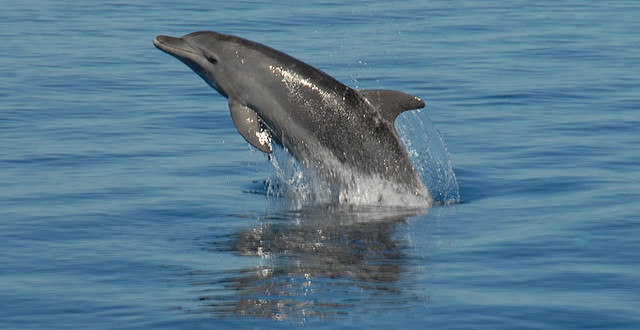Bottlenose dolphin; photo by Blue Dolphin Marine Tours on Flickr (noncommercial use permitted with attribution / no derivative works).
Bottlenose Dolphin
South Carolina designated the bottlenose dolphin as the official state marine mammal in 2009. Dolphins are found worldwide, mostly in the shallower seas of the continental shelves. They are carnivores, eating primarily fish and squid. Often incorrectly called porpoise, dolphins are in the order Cetacea (whales) and are considered to be among the most intelligent of animals.
The following is from DOLPHIN RESEARCH CENTER, 58901 Overseas Highway, Grassy Key, FL 33050-6019, Phone: 305-289-1121, Website: www.dolphins.org:
The bottlenose dolphin (Tursiops truncatus) is the dolphin most familiar to the general population because of its adaptability for living under human care. Bottlenose dolphins can be seen in various shows and research facilities and have been the "stars" of many movies and television shows. A few dolphins have learned to use a simple artificial language consisting of hand gestures or computer-generated whistles.
Communication in bottlenose dolphins appears to be extensive and complex. A dolphin maintains an intricate social network that includes a few close associates (such as mothers and calves or pair-bonded males), plus more casual relationships with others who come and go within a larger group. Dolphins hunt together to find food. Pods of dolphins coordinate their movements to herd prey, and then take turns swimming into the middle of the assembled fish to eat.
Scientists believe that every bottlnose dolphin develops a signature whistle. This whistle appears to serve as a means of individual identification, much like a name. It may let the rest of the pod know which pod members are around, where they are, and perhaps something about their mental state. Dolphins in distress sometimes emit their signature whistles very loudly. Dolphins often respond to another dolphin's whistle by whistling themselves or moving toward the whistler. If they become separated, a young calf and its mother whistle frequently until reunited. Dolphins also whistle when separated from other group members.
Dolphins are capable of imitating certain sounds very accurately and often learn other dolphins' whistles, possibly to get its attention within a large group. Varied body language also plays a role in dolphin communication - from shaking the head to "hand holding"(swimming with pectoral fins overlapping).

